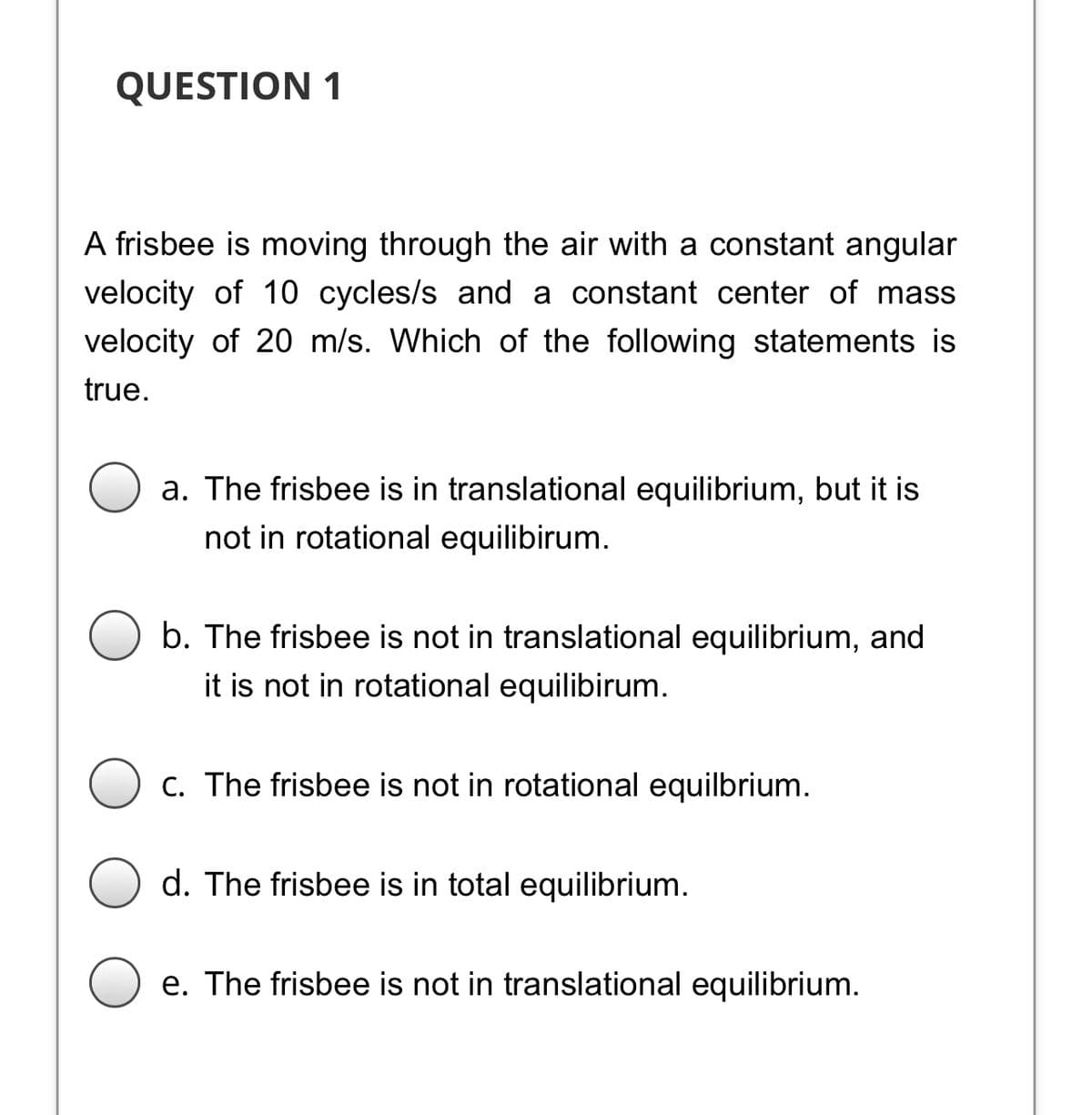A frisbee is moving through the air with a constant angular velocity of 10 cycles/s and a constant center of mass velocity of 20 m/s. Which of the following statements is true. a. The frisbee is in translational equilibrium, but it is not in rotational equilibirum. b. The frisbee is not in translational equilibrium, and it is not in rotational equilibirum. C. The frisbee is not in rotational equilbrium. d. The frisbee is in total equilibrium. e. The frisbee is not in translational equilibrium.
A frisbee is moving through the air with a constant angular velocity of 10 cycles/s and a constant center of mass velocity of 20 m/s. Which of the following statements is true. a. The frisbee is in translational equilibrium, but it is not in rotational equilibirum. b. The frisbee is not in translational equilibrium, and it is not in rotational equilibirum. C. The frisbee is not in rotational equilbrium. d. The frisbee is in total equilibrium. e. The frisbee is not in translational equilibrium.
University Physics Volume 1
18th Edition
ISBN:9781938168277
Author:William Moebs, Samuel J. Ling, Jeff Sanny
Publisher:William Moebs, Samuel J. Ling, Jeff Sanny
Chapter10: Fixed-axis Rotation
Section: Chapter Questions
Problem 62P: An electric sander consisting of a rotating disk of mass 0.7 kg and radius 10 cm rotates at 15...
Related questions
Question
100%

Transcribed Image Text:QUESTION 1
A frisbee is moving through the air with a constant angular
velocity of 10 cycles/s and a constant center of mass
velocity of 20 m/s. Which of the following statements is
true.
a. The frisbee is in translational equilibrium, but it is
not in rotational equilibirum.
b. The frisbee is not in translational equilibrium, and
it is not in rotational equilibirum.
C. The frisbee is not in rotational equilbrium.
d. The frisbee is in total equilibrium.
e. The frisbee is not in translational equilibrium.
Expert Solution
This question has been solved!
Explore an expertly crafted, step-by-step solution for a thorough understanding of key concepts.
This is a popular solution!
Trending now
This is a popular solution!
Step by step
Solved in 2 steps with 2 images

Knowledge Booster
Learn more about
Need a deep-dive on the concept behind this application? Look no further. Learn more about this topic, physics and related others by exploring similar questions and additional content below.Recommended textbooks for you

University Physics Volume 1
Physics
ISBN:
9781938168277
Author:
William Moebs, Samuel J. Ling, Jeff Sanny
Publisher:
OpenStax - Rice University

Physics for Scientists and Engineers: Foundations…
Physics
ISBN:
9781133939146
Author:
Katz, Debora M.
Publisher:
Cengage Learning

Physics for Scientists and Engineers, Technology …
Physics
ISBN:
9781305116399
Author:
Raymond A. Serway, John W. Jewett
Publisher:
Cengage Learning

University Physics Volume 1
Physics
ISBN:
9781938168277
Author:
William Moebs, Samuel J. Ling, Jeff Sanny
Publisher:
OpenStax - Rice University

Physics for Scientists and Engineers: Foundations…
Physics
ISBN:
9781133939146
Author:
Katz, Debora M.
Publisher:
Cengage Learning

Physics for Scientists and Engineers, Technology …
Physics
ISBN:
9781305116399
Author:
Raymond A. Serway, John W. Jewett
Publisher:
Cengage Learning

College Physics
Physics
ISBN:
9781285737027
Author:
Raymond A. Serway, Chris Vuille
Publisher:
Cengage Learning

College Physics
Physics
ISBN:
9781305952300
Author:
Raymond A. Serway, Chris Vuille
Publisher:
Cengage Learning

Principles of Physics: A Calculus-Based Text
Physics
ISBN:
9781133104261
Author:
Raymond A. Serway, John W. Jewett
Publisher:
Cengage Learning